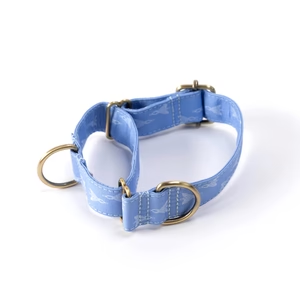
The Pros And Cons Of Using A Martingale Collar For Your Dog
Read Count : 289
Category : Blogs
Sub Category : Miscellaneous
Martingale collars have become a popular choice among dog owners, especially for those with dogs that tend to pull or slip out of their traditional collars. But is a Martingale collar the right choice for your pup? In this blog, we’ll explore what Martingale collars are, their advantages, and potential drawbacks, helping you make an informed decision. What is a Martingale Collar? A Martingale collar is a type of dog collar designed to provide better control without choking or causing discomfort to your dog. Also known as a "no-slip" collar, it features two loops: a larger loop that goes around your dog’s neck and a smaller loop where the leash is attached. When your dog pulls, the smaller loop tightens, gently constricting the larger loop, which prevents the collar from slipping off your dog’s head. These collars were originally designed for dogs with slim heads like Greyhounds, but today they are widely used for dogs of all shapes and sizes. Let’s take a closer look at the pros and cons of using Martingale collars. Pros of Using a Martingale Collar 1. Prevents Slipping One of the biggest advantages of a Martingale collar is its no-slip design. Some dogs, especially those with narrow heads or thick necks, can easily slip out of regular collars. Martingale collars prevent this by gently tightening when the dog pulls, ensuring the collar stays securely in place. 2. Gentle Control Unlike traditional choke chains or prong collars, Martingale collars provide gentle correction without causing pain or injury to your dog. The limited constriction prevents the collar from becoming too tight, making it a safer option for your dog’s neck. 3. Ideal for Training Martingale collars are particularly helpful during leash training. If your dog tends to pull on walks, a Martingale collar offers more control without the harshness of choke chains. It encourages your dog to learn loose-leash walking by applying gentle pressure when they pull and releasing it when they stop. 4. Comfortable for Your Dog Because a Martingale collar only tightens when necessary, your dog can wear it comfortably for extended periods. The collar remains loose when your dog isn’t pulling, allowing them to move freely and without constant pressure on their neck. 5. Great for Dogs with Narrow Heads If you own a Greyhound, Whippet, or any other breed with a narrow head, you’ll likely find that Martingale collars are a perfect fit. Traditional collars often slip off these breeds due to their head shape, but Martingale collars ensure they stay secure. Cons of Using a Martingale Collar 1. Not Suitable for Unsupervised Use While Martingale collars are great for walks and training, they are not recommended for unsupervised wear. The tightening mechanism, while safe under supervision, could become a hazard if the collar gets caught on something when your dog is alone. For this reason, many dog experts recommend removing the collar when your dog is left unattended. 2. Limited Tightening Although the limited constriction of a Martingale collar is generally a pro, it can be a con for some dog owners. If your dog is extremely strong or a determined puller, a Martingale collar may not offer enough control compared to a harness or more heavy-duty training collar. 3. Requires Proper Fitting Martingale collars need to be properly fitted to be effective and safe. If the collar is too tight, it can become uncomfortable for your dog, even when they are not pulling. If it's too loose, it may not provide the desired control. Getting the fit just right requires some attention, and you may need to adjust it over time as your dog grows or their behavior changes. 4. Not Suitable for All Dogs While Martingale collars work well for many dogs, they are not ideal for all. Dogs with short snouts or respiratory issues, like Pugs or Bulldogs, might experience discomfort if the collar tightens too much. For such breeds, a harness might be a better option. How to Choose the Right Martingale Collar If you decide that a Martingale collar is right for your dog, it’s important to choose one that fits properly. Measure your dog’s neck to ensure the collar isn’t too tight or too loose. Many Martingale collars are adjustable, allowing you to customize the fit. Consider the material of the collar as well. Nylon Martingale collars are popular due to their durability and comfort. For more control, some Martingale collars come with chain loops instead of fabric, offering a quicker tightening action. Is a Martingale Collar Right for Your Dog? Martingale collars are an excellent option for many dog owners, especially those with dogs that are prone to slipping out of traditional collars. They offer gentle control, are ideal for leash training, and provide a comfortable fit for many dogs. However, it’s essential to ensure the collar is used correctly and fitted properly. Remember to remove the collar when your dog is unsupervised and monitor them during walks to prevent any issues. Ultimately, the decision to use a Martingale collar depends on your dog’s specific needs and behaviors. Whether you have a slender-headed dog or one that loves to pull, the Martingale collar might just be the perfect solution for keeping your pup secure and comfortable on walks. By understanding the pros and cons of using a Martingale collar, you can make the best choice for your dog's safety and comfort.
Comments
- No Comments

